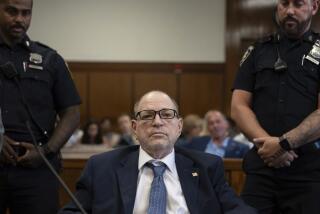Polanski gives no hint of returning to U.S.
- Share via
In February, more than three decades after movie director Roman Polanski decided the judge in a child-sex case was giving him a raw deal and fled to France, another Los Angeles judge extended an olive branch: There’s evidence you weren’t treated fairly, the judge said.
But if you want to ask that the charges be dismissed, he added, you must return to the U.S.
Los Angeles County Superior Court Judge Peter Espinoza gave Polanski 2 1/2 months to turn himself in. But as Thursday’s deadline approaches, there is no evidence the director of “Chinatown” and “The Pianist” will surrender.
He has not contacted the court. His lead attorney refused to say whether Polanski would return, and his agent, Jeff Berg, would say only that the director is currently “shooting a picture in Germany” -- a political thriller starring Pierce Brosnan and Ewan McGregor.
There also is no indication that Polanski, a French citizen, has taken any steps to cut through the bureaucratic red tape he must deal with before he could travel to Los Angeles.
Polanski’s 1977 guilty plea to unlawful sexual intercourse with a 13-year-old girl constitutes a crime of “moral turpitude,” which precludes foreigners from getting on an airplane bound for the U.S., according to a U.S. Customs and Border Protection spokeswoman.
A State Department official said someone with such a charge on their record would have to apply for a visa at an American embassy, produce documents explaining why he or she required entry to the U.S. and await clearance from the Department of Homeland Security.
A court spokesman said no one from Polanski’s camp has sought a letter from the judge detailing the need for Polanski’s presence.
Once on American soil, Polanski faces immediate arrest as a fugitive, but a spokesman for the Los Angeles County Sheriff’s Department said neither the director nor his representatives have reached out to the agency.
At the February hearing, the judge urged Polanski’s attorneys to give him plenty of notice to make security arrangements for his arrival.
“These things aren’t done by the seat of the pants in an instant,” said court spokesman Allan Parachini.
Among other necessary preparations, he said, would be a plan to manage the large number of international news media expected for any appearance by Polanski.
Los Angeles was the scene of some of his greatest triumphs, including the filming of “Chinatown” and “Rosemary’s Baby”; in 2003, he won an Academy Award for best director for “The Pianist.” But L.A. also was the site of his greatest heartbreak -- the 1969 murder of his wife, Sharon Tate, by followers of Charles Manson.
Polanski has given mixed signals about whether coming back to the U.S. is important to him.
Since December, his attorneys have mounted an aggressive and presumably costly attempt to have the case thrown out.
The acknowledgment by Espinoza, the supervising judge of the criminal division, of misconduct in the handling of Polanski’s case came after hundreds of pages of court filings suggesting that new information -- much of it from a documentary released last year -- shows judicial and prosecutorial wrongdoing.
But in one of the documents, a lawyer for Polanski said the director, now 75 and remarried with two children, “has no plans ever to return to the United States.”
If Polanski does not appear in court next week, Espinoza has said he will deny the director’s request for a dismissal of the case.
That will not spell the end of the 32-year-old case, however. In a letter to another judge earlier this month, a lawyer for Polanski said he would appeal if the request was denied.
--
More to Read
Sign up for Essential California
The most important California stories and recommendations in your inbox every morning.
You may occasionally receive promotional content from the Los Angeles Times.









